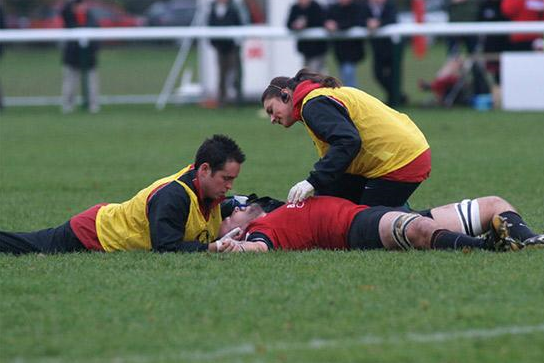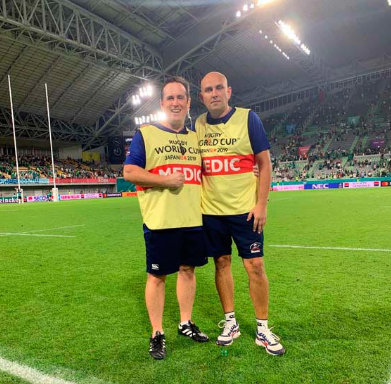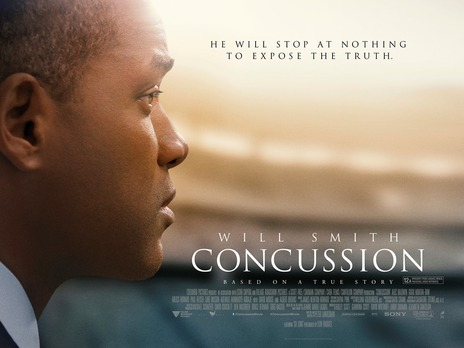The top tips for treating concussion injury in Rugby
By Mike James | 11th February 2020 | Advice

With the Guinness 6 Nations now in full flow, there is a strong probability that a star player will be absent from an important game before the tournament ends due to a concussion injury.
We have all seen and heard of the fabled Head Injury Assessment (HIA) and concussion protocol, but what do we actually understand about the condition, it's diagnosis, management and if possible, how to reduce the risk of it happening?.
We are so privileged to have member therapists on our platform with world class expertise in their chosen sports, so who better to ask for the best advice on this condition than Rugby World Cup Physio Chris Jenkins of CJ Physio.
Chris has 20 years experience working in elite sport and is a contact sports specialist with expertise in Rugby Diagnostics, Injury Management Rehabilitation and Reconditioning.
Chris is currently employed as the Head Physiotherapist for Russia Rugby and his role includes the development of nation wide high performance medical systems within the sport.

SRC- Sports Related Concussion in Rugby
Setting the Scene… Mechanism of Injury in SRC:
One Saturday while playing your big local derby Rugby game….
It’s the Final 10 mines of a game, the score is 14-14, you are the Open Side Flanker and have put in a number of big tackles in a game, and getting fatigued!
All of a sudden the opposition team’s star winger, a big lump, is on the rampage again and heading straight for you. He steps and moves and you tackle but get your head in the wrong position, and make a direct impact with your head onto his knee and they bowl you off….
What do you feel and what do people see? -
Signs and Symptoms of SRC (see Concussion Recognition Tool 5 Below)
Signs (What you see): Lying Motionless, slow to get up, poor balance/coordination, vacant expression, confusion, facial injury- these are the key things to watch out for
Symptoms (What you are told): You may have any of the following: Headache, Dizziness, Visual Disturbance, Neck pain, Confusion, Drowsiness, Pressure in head, feeling slowed down, Sensitivity to light/sound
Background to SRC:
Concussion and Head Injury in Sport has a high media profile and is a condition to take seriously. Concussion is a traumatic type of brain injury, causing a disturbance of brain function due to direct or indirect injury to head. You don’t have to be knocked out to have a concussion injury. Diagnosis is predominately made during clinical assessment, with Brain Scans being normal on the whole.
There are American Football lawsuits that involve billions of pounds related to the historical poor recognition and management of this condition in the USA and it has become high profile in the UK in Rugby Union, with the sport taking it seriously.
 A blockbuster film has even been released in 2015 named Concussion, starring Will Smith, highlighting a doctor who has researched and discovered changes in the brain that occur with repeated head blows in the NFL known as Chronic Traumatic Encephalopathy (CTE).
A blockbuster film has even been released in 2015 named Concussion, starring Will Smith, highlighting a doctor who has researched and discovered changes in the brain that occur with repeated head blows in the NFL known as Chronic Traumatic Encephalopathy (CTE).
My experience of concussion within Rugby Union in the Aviva Premiership and PRO14 rugby has been very challenging as a clinician and can be very stressful and worrying for the injured player.
I have dealt with numerous concussion episodes in elite professional players, the majority of which have made a full recovery. There have also been the players not so lucky, that have had to retire, on advice of a neurologist because of ongoing symptoms and high risk of future episodes.
The condition has not always been taken seriously by players and coaches in the past. This is often due to it being considered an ‘Invisible injury’. There is no slings or bandages, so the player can appear/look normal often within 24-48 hours post injury.
If you take a blow to the head, feel any strange symptoms (including headaches, dizziness, blurring of vision, neck pain, nausea, balance issues or loss of orientation) and don’t have a pitch side medical team immediately available to you, I recommend you remove yourself from play and not return to play that day.
This is what’s recommended by current guidelines (British Journal of Sports Medicine). This is particularly important in children, who can have severe and repetitive episodes.
Please seek medical advice for yourself and loved ones.
Remember this important motto: “If in doubt, sit them out”!
Treatment Tips:
1. Recognise - Don’t kid yourself, or be pressured by anyone to return to play- this is a form of Brain Injury and not replaceable like Joints later in life
2. Recovery - Physical and Cognitive Rest with Good Nutrition and Sleep Patterns- due to this being a type of Brain Injury, manage it seriously and have a low threshold for seeking advice of a qualified Healthcare professional or Doctor that has experience in management of Sport Related Concussion
3. Education - Follow National and International Concussion/Head Injury Protocol- I have attached links for the general public and for medical professionals to guide your own or your patient’s recovery.
4. Rehabilitation - The current research evidence would suggest that these injuries should not be seen any differently to any other sports injury and should follow a recovery and rehabilitation process. This is a complex area, with elite sports stars having access to Club Medics and External Multidisciplinary teams
Links:
1. My Instagram TV Video talk on HIA
2. World Rugby Player Welfare Education Website for General public and HCP’s
3. WRU link to general public concussion guidelines
4. Pocket Concussion Tool for all Sports Healthcare professional/therapist
